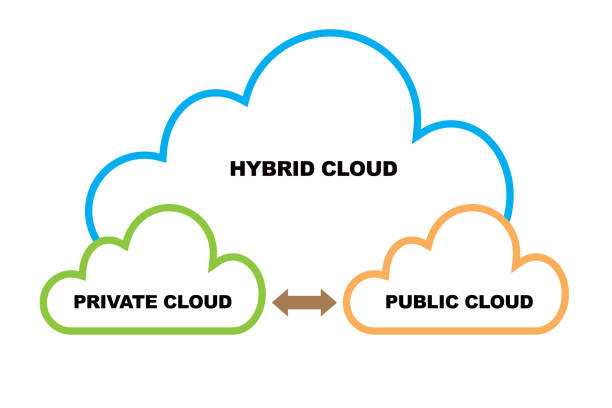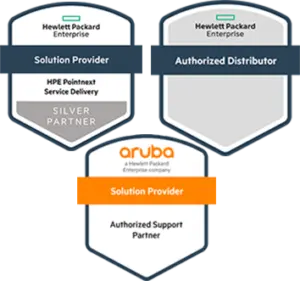
Hybrid Cloud: The Perfect Balance of Flexibility and Security
Where organizations seek to strike a balance between security and flexibility. In this day and age of perpetual innovation and quick technological growth, the hybrid cloud has emerged as a dazzling star, bringing a delightful blend of both attributes. Prepare to embrace the exciting world of hybrid cloud computing, where flexibility and firm security coexist.
Assume you could use cutting-edge technology like artificial intelligence and blockchain to keep your critical data as safe as Fort Knox. You might quickly grow or shrink your activities to meet changing market demands. In reality, the hybrid cloud does just that. It’s like getting the best of both worlds since you can enjoy the cloud’s endless possibilities while still having the piece of mind that comes with better security safeguards.
Adaptability is critical for the success of any firm in today’s hyperconnected environment. Only the hybrid cloud fully comprehends this.
Understanding the Hybrid Cloud

The hybrid cloud enables enterprises to exploit the benefits of each platform while limiting their vulnerabilities by strategically mixing public and private cloud systems. Because of their simple scalability and low cost, public clouds such as AWS, Azure, and Google Cloud are perfect for managing dynamic workloads. Private clouds, on the other hand, offer increased protection and control while still meeting sensitive data and compliance standards.
Benefits of Hybrid Cloud Adoption:
- Flexibility and Scalability: The hybrid cloud gives your company unequaled scalability to manage shifting demand. Workloads can be easily shifted between public and private clouds to properly handle seasonal or unplanned traffic increases.
- Enhanced Security: When dealing with sensitive information, organizations usually prioritize security. You can preserve critical data on-premises while simultaneously benefiting from the robust security provided by public cloud providers with the hybrid cloud architecture.
- Cost Optimisation: Assembly Managed Services understands how important cost considerations are for organizations of all sizes. A hybrid cloud strategy allows you to save money by using public cloud resources for non-critical workloads and private cloud resources just for mission-critical applications.
- Compliance and Regulation: Each industry has its own set of rules, which might be difficult to follow in a private or public cloud environment. Hybrid cloud solutions enable you to benefit from cloud innovations while remaining compliant.
- Disaster Recovery and Business Continuity: Assembly Managed Services, as a reliable IT partner, emphasizes the necessity of a disaster recovery strategy. You may boost your organization’s resilience and assure business continuity amid unanticipated outages by leveraging the hybrid cloud.
Navigating the Hybrid Cloud Adoption:
Assembly Managed Services understands that each company’s path to the cloud is unique. Our experts will collaborate with you to analyze your organization’s needs, build a unique hybrid cloud strategy, and carry out a seamless migration plan.
- Assessment: To establish the best hybrid cloud architecture for your company, our trained consultants will thoroughly examine your present infrastructure, apps, and data.
- Design and Planning: Assembly Managed Services will work with your team to create a solid hybrid cloud architecture that supports your organization’s goals while guaranteeing seamless integration of public and private cloud resources.
- Migration and Implementation: Our cloud-trained specialists will painstakingly supervise the migration operation to ensure least downtime and maximum productivity during the transfer.
- Management and Support: Aside from migration, our dedicated support staff will regularly monitor and maintain your hybrid cloud system, offering preventative solutions and rapid troubleshooting.
Businesses seeking agility, security, and cost-effectiveness now have a powerful choice in the hybrid cloud. Assembly Managed Services is ready to be your trustworthy partner as you adopt and utilize the hybrid cloud’s possibilities. Let’s work together to transform your IT infrastructure and open up new doors for your business.
Scalability and Elasticity of Hybrid Cloud Solutions

Scalability and elasticity are fundamental features that determine the efficacy and productivity of any cloud system, including hybrid cloud solutions. These qualities are required for businesses to be able to adapt to changing business requirements, manage unexpected growth, and maximize resource use.
Hybrid cloud solutions provide unrivaled scalability and flexibility. The capacity to scale up or down resources based on demand is one of the key benefits of hybrid clouds. Organizations can benefit from the scalability of public clouds while preserving control over sensitive data in private clouds by mixing private and public clouds.
Organizations can extend their infrastructure horizontally or vertically in a hybrid cloud environment. Horizontal scalability is expanding the number of instances or nodes in order to spread the burden over numerous resources. This method ensures that resources may be easily extended to meet rising demand.
Seamless Integration of On-Premises and Public Cloud Resources
Organizations are increasingly using a hybrid approach to their IT infrastructure in today’s technology-driven culture. This approach combines the advantages of on-premises and public cloud resources to create a resilient and adaptive environment that suits their individual business requirements. To enhance performance, scalability, and cost-efficiency, enterprises of all sizes must integrate these two resource groups seamlessly.
The capacity to interact and perform across a hybrid infrastructure is referred to as the seamless integration of on-premises and public cloud services. So it enables businesses to extend their existing on-premises infrastructure to the public cloud, allowing for uniform management and usage. This integration has several benefits, such as increased redundancy, scalability, and agility.
Increased flexibility is one of the key advantages of merging on-premises and public cloud services. Businesses can use the public cloud’s flexibility to scale their infrastructure up or down based on demand. Their on-premises infrastructure may be effortlessly extended to the cloud, allowing them to deliver extra compute or storage resources fast during peak periods or unforeseen workload increases. This assures peak performance without the need for expensive hardware upgrades that may not be used during everyday operations.
READ MORE:
Unleashing the Power of HPE Storage: A Game-Changer for SMBs
Frequently Asked Questions (FAQs)
1. What Is the Difference Between Public Cloud and Private Cloud?
The term “public cloud” refers to cloud services that are accessible to everyone who has access to the Internet. On the other hand, a single enterprise uses a private cloud as its cloud computing infrastructure. Third-party suppliers handle public cloud services, whereas the corporation or a third-party provider manages private cloud services.
2. Can I Migrate My Existing Applications to the Hybrid Cloud?
You can transfer current apps to the hybrid cloud. So it is critical to analyze the apps’ compliance with this architecture and make any necessary changes to ensure seamless integration and optimal performance.
3. How Does Hybrid Cloud Ensure Data Security?
Due to improved control and compliance with data security requirements, this enable enterprises to keep sensitive data and critical applications in a private cloud environment. Using the public cloud for non-sensitive apps can help to limit the possibility of data breaches and unauthorized access.
4. Is Hybrid Cloud Suitable for Small Businesses?
Yes, even small organizations may profit from this computing. Using the public cloud for non-critical applications results in cost savings and the ability to grow infrastructure according to business needs. Small organizations should carefully examine security, interoperability, and cost management before using this solution.
5. How Can I Ensure Seamless Integration Between Public and Private Cloud Environments?
Organizations should choose cloud service providers who provide extensive support for hybrid cloud deployments to ensure seamless integration. They must also put in place the essential security safeguards to protect data in transit and to offer secure connectivity between public and private cloud environments.
To Conclude
In today’s digital environment, it provides businesses with the best combination of flexibility and security. It combines the greatest aspects of both public and private clouds, giving organizations unprecedented flexibility and customization options while protecting their sensitive data.
Businesses may grow their infrastructure and resources as needed thanks to the flexibility of the hybrid cloud, avoiding the need for costly hardware expenditures and improving their capacity to quickly adjust to changing market conditions. Businesses can adjust to seasonal demand swings and unexpected growth without jeopardizing productivity or customer happiness.
Security is of the utmost importance in light of today’s cyber dangers. This issue is solved by the hybrid cloud, which allows enterprises to store their most critical data on-premises or in a private cloud while using public cloud services for less sensitive tasks. Businesses can keep exact control over their sensitive data by isolating it, ensuring regulatory compliance and lowering the chance of data breaches.
ICT Distribution Bangladesh is the best option for a dependable, efficient, and cost-effective HPE distributor. With their top-tier services, knowledgeable people, and cutting-edge technologies, they are your trusted HPE partner to help your firm succeed. So don’t put it off any longer; call us today to start building a positive relationship with us. Reach out to our sales team.
READ MORE:
Unlocking Business Potential: How HPE Servers Drive Growth for SMBs
Latest Posts



Comparing HPE Storage Server Models: Which One Suits Your Needs?

How HPE’s Innovations Are Shaping the Next Decade of Technology

Beyond Antivirus: Why Kaspersky Total Security is Your 2024 Digital Guardian


Comparing HPE Storage Server Models: Which One Suits Your Needs?



